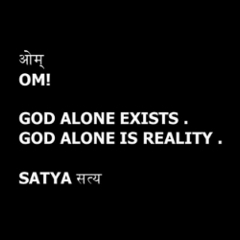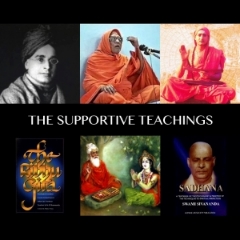THE ESSENCE OF BUDDHA'S TEACHINGS
| | homeTHE ESSENCE OF BUDDHA'S TEACHINGS
" The essence of the Buddha's teachings can be summed up in two principles :
1 . The Four Noble Truths
2 . The Eightfold Path
The first covers the side of doctrine , and the primary response it elicits is understanding ; the second covers the side of discipline , in the broadest sense of that word , and the primary response it calls for is practice . " ~ BHIKKHU BODHI
|| THE FOUR NOBLE TRUTHS ||
|| 1 || All things and experiences are marked by :
• Suffering
• Disharmony
• Frustration — ( Dukkha ) .
|| 2 || The arising of suffering , disharmony , frustration comes from :
• Desire
• Craving
• Clinging .
|| 3 || To achieve
• Cessation or end of suffering , disharmony , frustration
• Let Go of desire , craving , clinging .
|| 4 || The way to achieve cessation of suffering , disharmony , frustration , is walking The Eightfold Path .
|| THE EIGHTFOLD PATH TO THE CESSATION OF SUFFERING ||
|| 1 || RIGHT UNDERSTANDING ||
• The truth about suffering . . . ( The Four Truths ) ;
• Everything is impermanent and changes ;
• There is no separate individual self — this is an illusion .
|| 2 || RIGHT DETERMINATION ||
• Give up what is wrong and evil ;
• Undertake what is good ;
• Abandon thoughts that have to do with bringing suffering to any conscious being ; cultivate thoughts of loving kindness , that are based on caring about others' suffering , and sympathetic joy in others' happiness .
|| 3 || RIGHT SPEECH ||
• Abstain from telling lies .
• Abstain from talk that brings harm or discredit to others ( such as backbiting or slander ) or talk that creates hatred or disharmony between individuals and groups .
• Abstain from harsh , rude , impolite , malicious , or abusive language .
• Abstain from idle , useless , and foolish babble and gossip ; recrimination and negative statements .
• Abstain from harsh speech — practice kindly speech .
• Abstain from frivolous speech — practice meaningful speech .
• Abstain from slanderous speech — practice harmonious speech .
• Speak the truth if it is useful and timely . Practice only necessary speech . Let your speech be filled with loving kindness . Speak that which alleviates suffering .
|| 4 || RIGHT ACTION ||
• Peaceful , honorable conduct ; abstain from dishonest dealings ; take concrete steps necessary to foster what is good .
• Do things that are moral , honest , and alleviate suffering . Do not do things that will bring suffering to others or yourself .
|| 5 || RIGHT LIVELIHOOD ||
• Abstain from making your living from an occupation that brings harm and suffering to humans or animals , or diminish their well being .
This includes : Activities that directly harm conscious beings , and activities that indirectly harm sentient beings .
|| 6 || RIGHT EFFORT ||
• Foster good and prevent evil .
• Work on yourself — be engaged in appropriate self-improvement .
The essence of right effort is that everything must be done with a sense of proper balance that fits the situation .
Effort should be balanced between trying too hard and not trying hard enough . For example , strike the balance between excessive fasting and over-indulgence in food . Trying hard to progress too rapidly gets poor results , as does not trying hard enough .
|| 7 || RIGHT MINDFULNESS OR WAKEFULNESS :
• Foster right attention .
• Avoid whatever clouds our mental awareness .
• Systematically and intentionally develop awareness .
|| 8 || RIGHT CONCENTRATION ||
• Developed by practicing meditation andor mental focusing .
Proper meditation must be done continuously while awake , and should include work on awareness of body , emotions , thought , and mind objects .
|| FIVE BASIC PRECEPTS ||
|| 1 || Abstain from killing living beings ( destroying , taking life ) — or practice love .
|| 2 || Abstain from taking the not-given ( stealing ) — or practice generosity , practice giving .
|| 3 || Abstain from sexual misconduct — or practice contentment .
|| 4 || Abstain from false speech ( lying ) — or practice truthfulness .
|| 5 || Abstain from intoxicating substances — or practice awareness and mental clarity .
|| THE BUDDHA SAID ||
Do not believe in anything simply because you have heard it .
Do not believe in traditions because they have been handed down for many generations .
Do not believe anything because it is spoken and rumored by many .
Do not believe in anything because it is written in your religious books .
Do not believe in anything merely on the authority of your teachers and elders .
After observation and analysis , when you find that anything agrees with reason and is conducive to the good and the benefit of one and all , then accept it and live up to it .
|| THE BUDDHA SAID | ABOUT THE WORLD ||
• I consider the positions of rulers as that of dust motes .
• I observe treasures of gold and gems as so many bricks and pebbles .
• I look upon the finest silken robes as tattered rags .
• I see myriad worlds of the Universe as small seeds of fruit , and the greatest lake in India as a drop of oil upon my foot .
• I perceive the teachings of the world as the illusions of magicians .
• I discern the highest conception of emancipation as a golden brocade in a dream , and view the holy path of the illuminated ones as flowers appearing in one's eyes .
• I see meditation as a pillar of a mountain , nirvana as a nightmare of daytime .
• I look upon the judgments of right and wrong as the serpentine dance of a dragon , and the rise and fall of belief as traces left by the four seasons .
SOURCE | http://www.lucidcafe.com/library/96jun/buddha2.html
|| THE FUNDAMENTAL TEACHINGS OF THE BUDDHA ||
• THE FOUR NOBLE TRUTHS : That suffering is an ingrained part of existence ; that the origin of suffering is craving for sensuality , acquisition of identity , and annihilation ; that suffering can be ended ; and that following The Noble Eightfold Path is the means to accomplish this .
• THE NOBLE EIGHTFOLD PATH :
Right view , right intention , right speech , right action , right livelihood , right effort , right mindfulness , right concentration .
• Dependent origination : The mind creates suffering as a natural product of a complex process .
• Rejection of the infallibility of accepted scripture : Teachings should not be accepted unless they are borne out by our experience and are praised by the wise .
• Anicca ( Sanskrit : anitya ) : That all things that come to be have an end .
• Dukkha ( Sanskrit : duhkha ) : That nothing which comes to be is ultimately satisfying .
• Anatta ( Sanskrit : anatman ) : That nothing in the realm of experience can really be said to be " I " or " mine " .
• Nibbana ( Sanskrit : Nirvana ) : It is possible for sentient beings to realize a dimension of awareness which is totally unconstructed and peaceful , and end all suffering due to the mind's interaction with the conditioned world .
However , in some Mahayana schools , these points have come to be regarded as more or less subsidiary . There is disagreement amongst various schools of Buddhism over more complex aspects of what the Buddha is believed to have taught , and also over some of the disciplinary rules for monks .
According to tradition , the Buddha emphasized ethics and correct understanding .
Buddha questioned everyday notions of divinity and salvation .
Buddha stated that there is no intermediary between humans and the divine ; Buddha is only a guide and teacher for beings who must tread the path of Nirvana themselves to attain the spiritual awakening called Bodhi and understand reality .
The Buddhist system of insight and meditation practice is not claimed to have been divinely revealed , but to spring from an understanding of the true nature of the mind , which must be discovered by treading the path guided by the Buddha's teachings .
SOURCE | http://en.wikipedia.org/wiki/Gautama_Buddha#Teachings
|| NEXT || SELECTIONS FROM : THE NOBLE EIGHTFOLD PATH : THE WAY TO THE END OF SUFFERING BY BHIKKHU BODHI
SOURCE | SATYAVEDISM.ORG



































































































